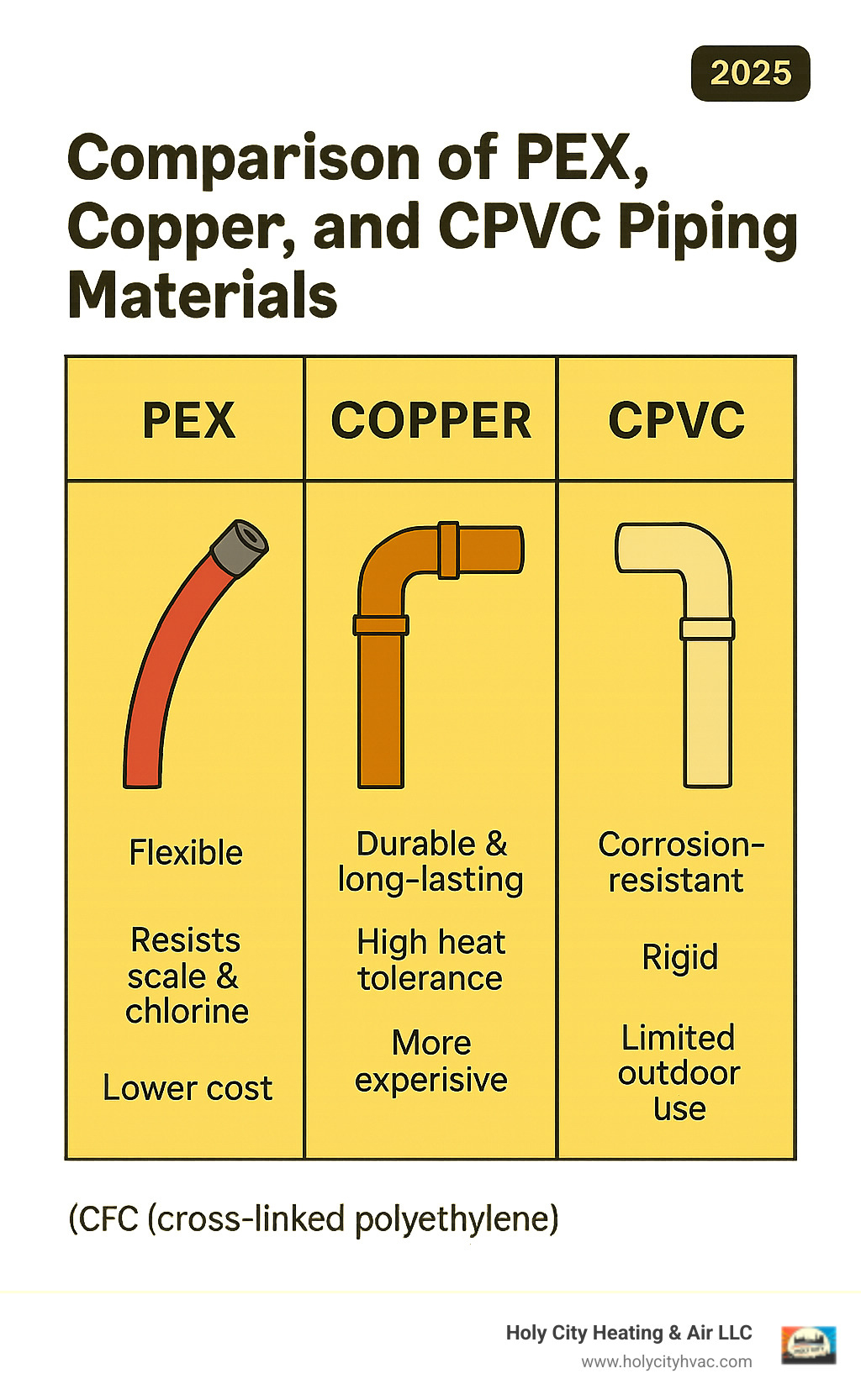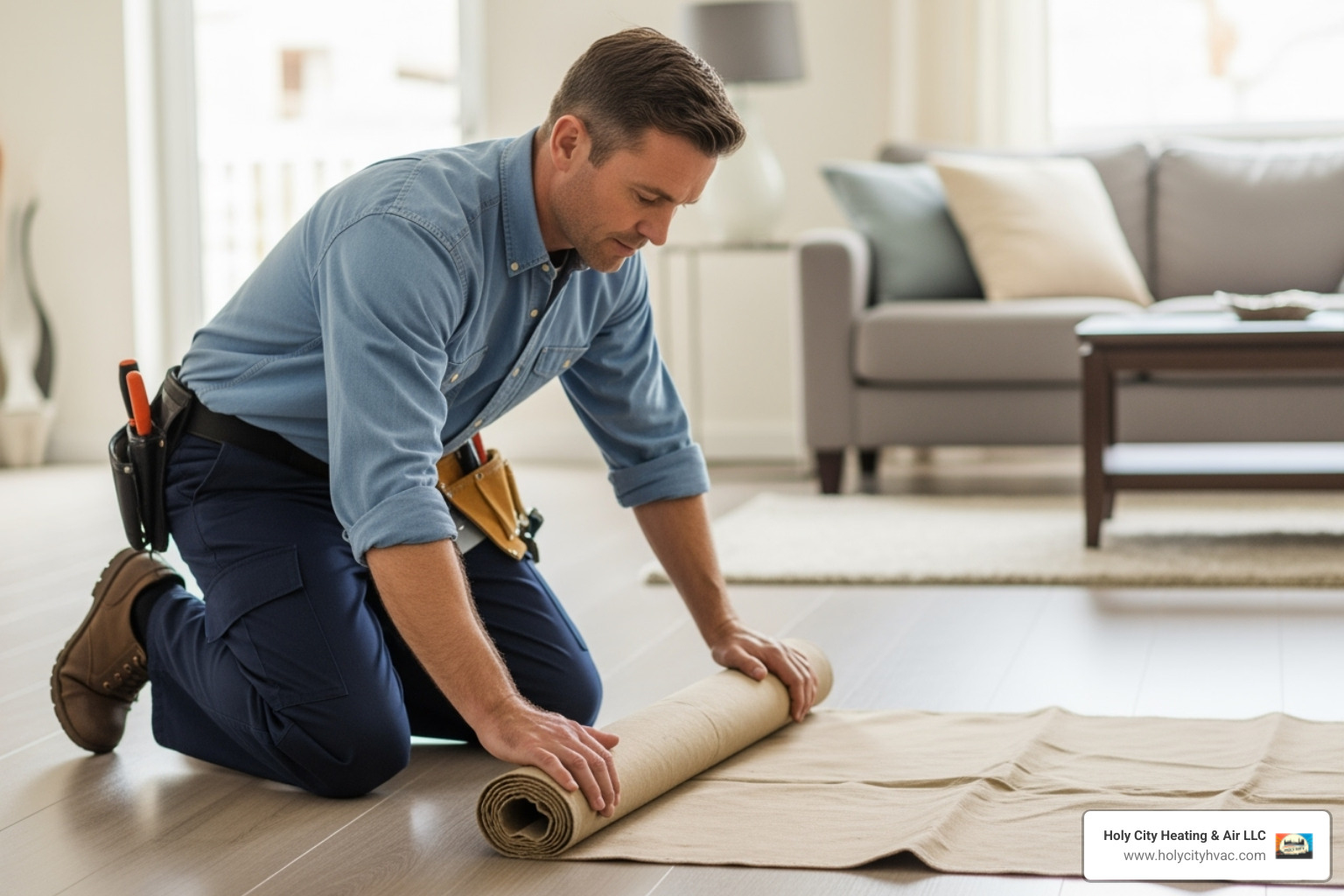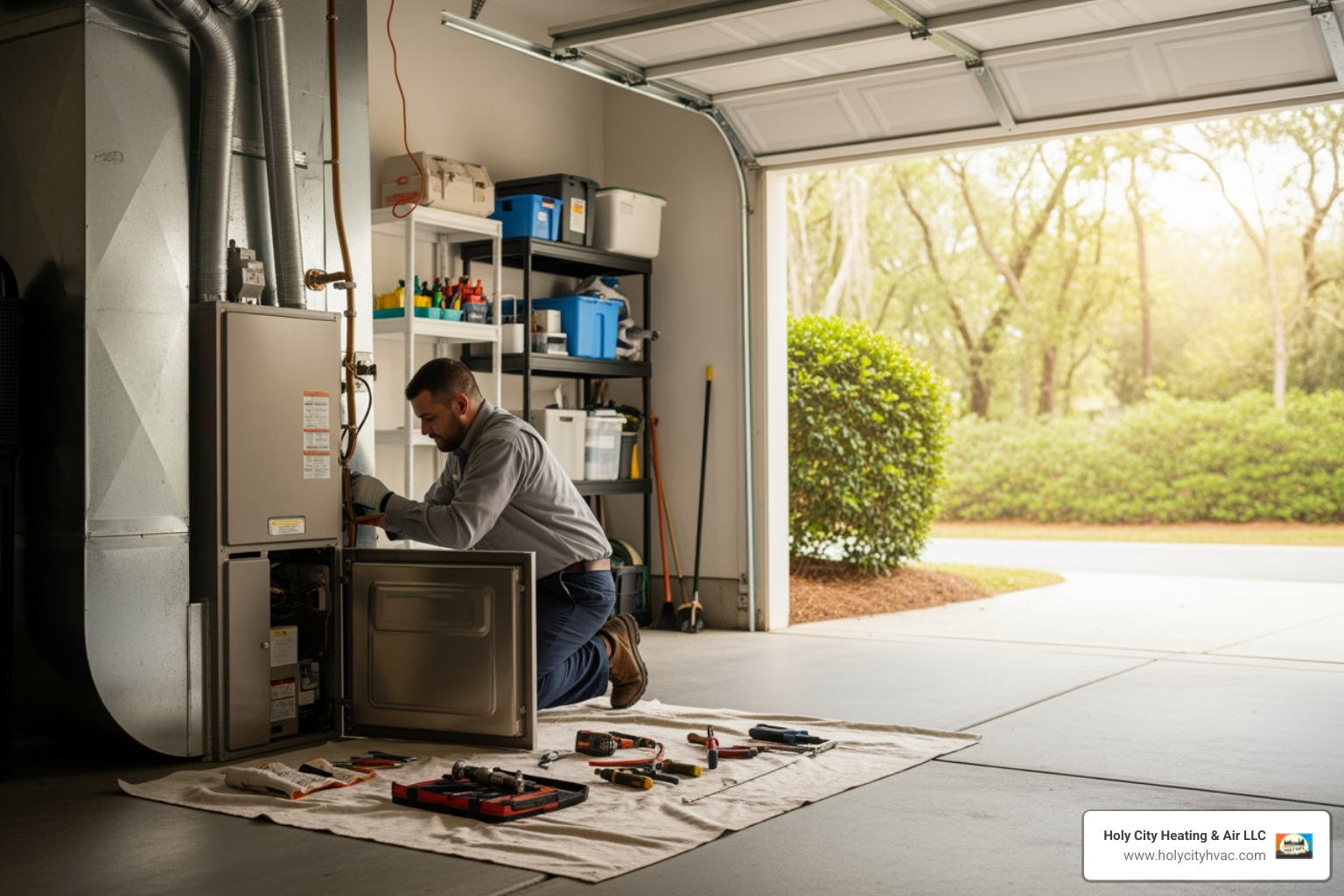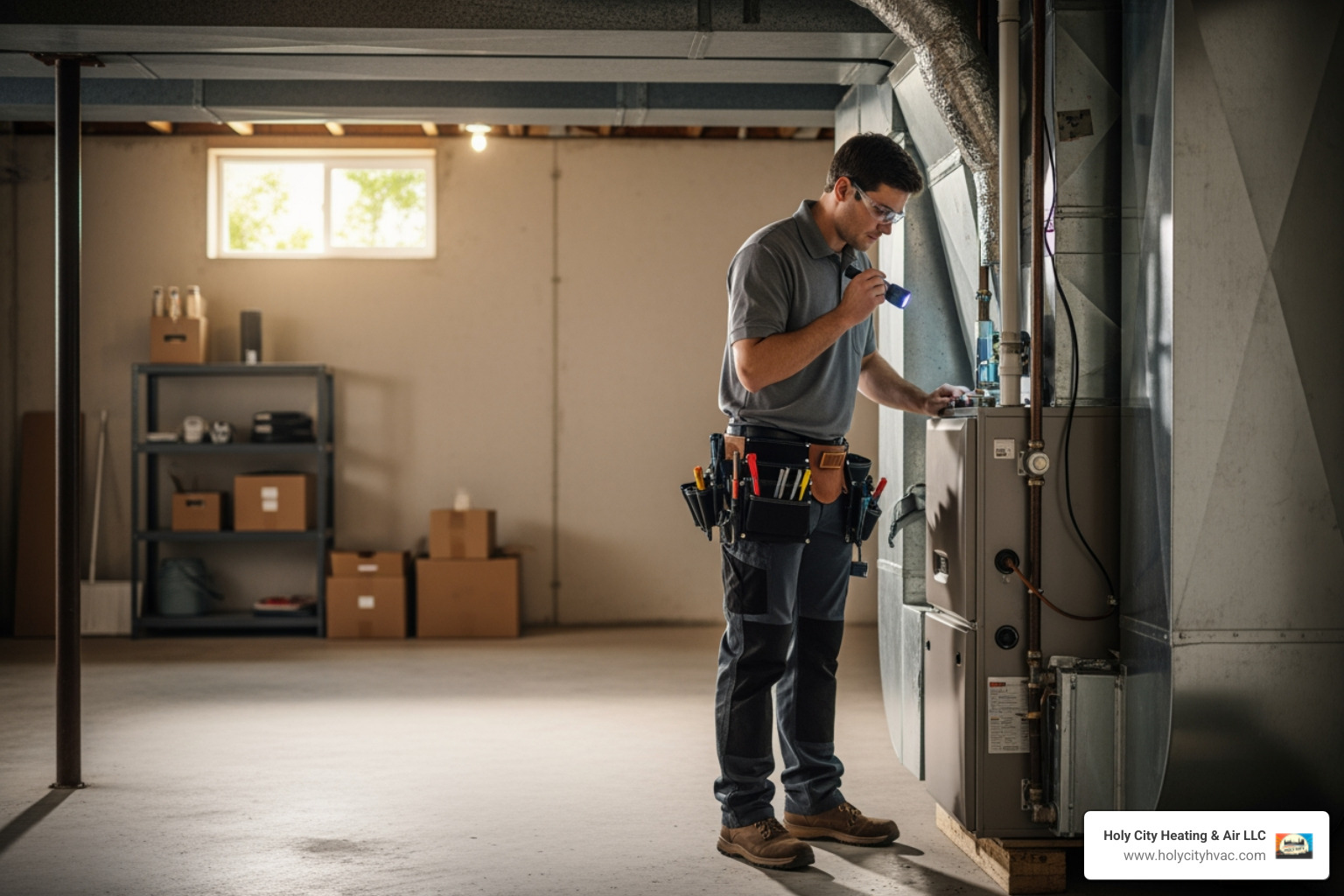
What Is a Whole House Repipe and Why It Matters
A whole house repipe is the complete replacement of your home's water supply pipes, from the main line to every fixture. This major plumbing project becomes necessary when your existing pipes are failing system-wide due to age, corrosion, or problematic materials.
Quick Answer: What You Need to Know
- Definition: Complete replacement of all water supply pipes in your home
- When needed: Frequent leaks, low pressure, rusty water, or pipes over 40+ years old
- Materials: Modern options include PEX, copper, or CPVC piping
- Timeline: Most homes can be repiped in 1-3 days
- Benefits: Better water quality, increased pressure, fewer repairs, and higher home value
Your home's plumbing is like the circulatory system of your house. When pipes start failing - whether from corrosion in old galvanized steel, brittle polybutylene, or simply decades of wear - you face a choice: keep patching individual leaks as they appear, or solve the problem once and for all.
The reality is stark: homes with systemic plumbing issues often experience multiple failures within months of each repair. As one homeowner shared in our research, they "wished they had known earlier how easy and affordable a whole-home repipe can be, after spending so much money on successive repairs and water damage."
This guide walks you through everything you need to know about whole house repiping - from recognizing the warning signs to understanding your material options and what to expect during the process. We'll help you make an informed decision about this important investment in your Charleston home's future.

Is It Time for a Whole House Repipe? Key Warning Signs
Your home has a way of talking to you – and when it comes to plumbing, those conversations usually aren't pleasant. Maybe it's that annoying drip that keeps you awake at night, or the shower that barely produces enough water to rinse the shampoo from your hair. These aren't just minor inconveniences; they're often your home's way of telling you it might be time for a whole house repipe.

Frequent leaks are usually the first red flag most homeowners notice. If you're constantly calling for repairs or finding yourself under the sink with a wrench, your pipes are trying to tell you something important. Those pinhole leaks in copper pipes might look harmless, but they often signal widespread corrosion happening throughout your system. When one leak leads to another within months, you're looking at a systemic problem rather than isolated incidents.
Low water pressure can turn your morning routine into a frustrating experience. When your shower feels more like a gentle mist than a refreshing spray, the culprit is often decades of mineral buildup inside your pipes. As pipes age, these deposits create narrower pathways for water to flow through, leaving you with weak pressure at multiple fixtures throughout your home.
Discolored or rusty water is perhaps the most obvious sign that something's seriously wrong. If your water comes out cloudy, yellow, or reddish – especially first thing in the morning – your pipes are literally dissolving from the inside out. This is particularly common with old galvanized steel pipes that release rust particles directly into your drinking water.
Along with discoloration, strange odors from your taps can indicate compromised pipe integrity. When pipes corrode, they don't just change how your water looks – they can introduce metallic tastes and unpleasant smells that make even brushing your teeth an unpleasant experience.
Noisy pipes create their own special brand of household drama. That banging, clanging, or whistling sound when you turn on the water – often called water hammer – happens when water pressure changes suddenly or pipes become loose. While sometimes fixable, persistent noise often points to deeper issues within your plumbing system.
The age and type of your old pipe materials play a huge role in determining whether a whole house repipe is in your future. Galvanized steel pipes, common in homes built before the 1940s, are notorious troublemakers. They corrode from the inside out, creating all those problems we just discussed – low pressure, rusty water, and eventual leaks.
Polybutylene pipes, used from the late 1970s through the mid-1990s, present their own unique challenges. These plastic pipes become brittle over time and can fail suddenly and catastrophically due to chemical reactions with water disinfectants. If you have these gray or blue pipes, replacement isn't just recommended – it's essential for preventing major water damage.
Your plumbing system age matters more than you might think. Even if everything seems fine on the surface, pipes over 40 years old are approaching the end of their useful life. It's like driving an old car that runs great until the day it doesn't – except when plumbing fails, it usually involves water damage to your home.
When you start noticing these warning signs, especially multiple ones, it's time to have a professional take a closer look. Addressing these issues proactively with a whole house repipe can save you from the headache and expense of emergency repairs and water damage down the road.
Repiping Materials: Choosing the Right Pipes for Your Home
When you're ready for a whole house repipe, choosing the right piping material feels like a big decision – and it is! The pipes you select today will be carrying your family's water for decades to come. Each material has its own personality, if you will, with unique strengths that make it shine in different situations.

Let's walk through the three main options that work beautifully in Charleston homes, so you can understand what makes each one special.
PEX (Cross-Linked Polyethylene) Piping
PEX has become the star of modern plumbing, and once you understand why, it's easy to see how it earned that reputation. This flexible plastic tubing has revolutionized how we think about residential water lines.
Flexibility is PEX's superpower. Unlike rigid pipes that need to make sharp turns with fittings, PEX curves gracefully around corners and through tight spaces. It can snake through your walls like a garden hose, which means fewer fittings overall – and fewer fittings means fewer potential spots for leaks down the road.
Your Charleston home will particularly appreciate PEX's freeze resistance. When water freezes inside PEX, the pipe actually expands to accommodate the ice, then returns to its original shape when things thaw out. No more worrying about burst pipes during those occasional cold snaps we get here in the Lowcountry.
Corrosion resistance is another huge win. PEX doesn't rust, corrode, or build up mineral deposits like metal pipes can. Your water stays clean, and your pipes stay clear – even with our sometimes challenging Charleston water chemistry.
The one thing to keep in mind with PEX is its UV light sensitivity. Direct sunlight can weaken it over time, but this is rarely an issue since your pipes will be safely tucked inside your walls where they belong.
Copper Piping
Copper is the distinguished gentleman of plumbing materials – it's been doing the job reliably for generations, and it's still going strong. There's something reassuring about copper's proven track record.
Durability and longevity are copper's calling cards. A well-installed copper system can easily last 50 years or more, often outliving everything else in your home. It handles both high pressure and high temperatures without breaking a sweat, making it particularly excellent for homes with demanding water needs.
As a natural material, copper actually improves your water quality. It doesn't add anything harmful to your water supply and even helps inhibit bacterial growth. Plus, copper's excellent heat tolerance makes it ideal for hot water lines, though you'll want proper insulation to prevent heat loss.
The main consideration with copper is that it can be susceptible to acidic water. Over many years, highly acidic water can cause pinhole leaks. However, this is manageable with proper water treatment if needed, and it's not a concern for most Charleston area homes.
CPVC (Chlorinated Polyvinyl Chloride) Piping
CPVC offers a practical middle ground – it's the reliable, budget-friendly option that gets the job done well without breaking the bank. This rigid plastic pipe has earned its place in many homes across our area.
What makes CPVC special is that it's completely corrosion proof. The chlorination process creates a pipe that can handle temperatures up to 180°F and pressures up to 100 psi while resisting deposits and corrosion beautifully.
CPVC's rigidity means it installs more like traditional pipes, requiring fittings for direction changes. While this creates more connection points than flexible PEX, it's still far superior to older galvanized systems.
One thing to watch with CPVC is that some older formulations can become brittle over many years, especially if exposed to certain chemicals or consistently high temperatures. Modern CPVC formulations have largely addressed these concerns.
At Holy City Heating & Air, we take time to understand your home's unique characteristics – your water chemistry, your family's needs, and your long-term plans. This helps us recommend the perfect piping material for your whole house repipe project, ensuring you get decades of reliable service from your investment.
The Repiping Process: What to Expect from Start to Finish
A whole house repipe might sound overwhelming, but we've streamlined the process to make it as smooth as possible for Charleston homeowners. Think of it like a well-choreographed dance – every step is planned to minimize disruption while maximizing results.

The journey begins with a thorough initial inspection where our certified plumbers become detectives, examining every aspect of your current plumbing system. We'll map out problem areas, study your home's unique layout, and discuss which piping material – PEX, copper, or CPVC – makes the most sense for your situation. This isn't just about replacing pipes; it's about creating a detailed roadmap that ensures optimal performance while keeping disruption to your walls and floors at an absolute minimum. We'll handle all the paperwork too, including permits and ensuring everything meets Charleston's building codes.
Before we touch a single pipe, we transform into your home's protectors. Our team arrives with protective drop cloths, shoe covers, and everything needed to keep your living space clean and undisturbed. We treat your home like it's our own grandmother's house – with respect, care, and attention to detail. Any furniture in work areas gets moved or carefully covered, because nobody wants drywall dust on their favorite couch.
When it's time for the old pipe removal, we become surgical in our approach. After coordinating the main water shutoff (we often restore water each evening so you're not left high and dry), we make small, strategic openings in walls, ceilings, or floors. Here's where experience really matters – we know exactly where to look and how to access pipes with minimal damage. If your old pipes run under a concrete slab, we might recommend simply abandoning them in place rather than turning your home into a construction zone with expensive slab demolition.
The new pipe installation is where the real magic happens. Our skilled technicians carefully thread new water supply lines throughout your home, connecting every fixture from kitchen sinks to master bathroom showers. We use proper fittings and supports to prevent future headaches like rattling pipes or sagging lines. Most homeowners are amazed at how efficiently we work – the bulk of piping installation typically wraps up in just one or two days.
System testing is where we put our work to the ultimate test. We don't just turn on the water and hope for the best. Every new line gets pressure tested to ensure there are no leaks, and we carefully balance water pressure throughout your home. Every joint, every connection gets our scrutiny. If local regulations require municipal inspections, we coordinate those too.
Wall repair might be your biggest concern, and we get it. Nobody wants their home to look like a construction site indefinitely. Our team carefully patches any walls and ceilings we opened, matching existing textures as closely as possible and preparing surfaces for painting. We're not just plumbers – we're craftsmen who understand that the job isn't done until your home looks beautiful again. Then comes the thorough cleanup, removing every bit of debris and leaving your space tidy.
The final walkthrough is our favorite part because we get to see your reaction to crystal-clear water pressure and pristine water quality. We'll walk through your entire home together, demonstrating how everything works and sharing maintenance tips to help you get decades of trouble-free service from your new plumbing system. You'll receive all warranty information for both materials and our workmanship, plus our contact information for any future questions.
The entire whole house repipe process typically takes just a few days, but the peace of mind lasts for decades. Most homeowners tell us they wish they'd done it sooner once they experience the difference quality plumbing makes in their daily lives.
The Lasting Benefits of a Whole House Repipe
When you're facing constant plumbing headaches, a whole house repipe might feel like a big step. But here's the thing – it's one of those home improvements that keeps giving back long after the work is done. Let's talk about why this investment in your Charleston home's future is worth every penny.

Improved Water Quality and Pressure
Remember what it felt like to have a truly satisfying shower? If it's been a while, you're not alone. Old pipes have a sneaky way of stealing your water pressure and contaminating your water supply.
When we complete a whole house repipe, homeowners are often amazed at the difference. Better tasting water flows from every tap because we've eliminated those rusty, corroded pipes that were leaching metal particles and debris into your supply. No more metallic taste in your morning coffee or that slight brown tint when you first turn on the faucet.
Stronger showers become the new normal. Those mineral deposits and rust buildup that were choking your water flow are gone. Your efficient appliance performance improves too – your washing machine fills faster, your dishwasher cleans better, and your water heater doesn't have to work as hard to push water through clogged pipes.
A Proactive Solution to Your Whole House Repipe Needs
Here's what we've learned after years of helping Charleston families: there's a world of difference between constantly patching problems and actually solving them. A whole house repipe is the ultimate proactive move.
Fewer repairs means fewer emergency calls, fewer soggy ceiling tiles, and fewer weekends spent mopping up water. When you replace the entire system, you're not just fixing today's leak – you're preventing next month's burst pipe and next year's water damage disaster.
Preventing water damage is huge. We've seen too many families deal with the heartbreak and expense of flood damage from old, failing pipes. The systemic vs. localized issues approach makes sense when you think about it – if one section of your 40-year-old plumbing is failing, the rest isn't far behind.
Most importantly, you get long-term peace of mind. No more lying awake wondering if that dripping sound means trouble. No more hesitating to leave town for a weekend getaway. Your new plumbing system has your back.
Improved Home Value and Efficiency
A whole house repipe isn't just about fixing problems – it's about upgrading your entire home's infrastructure. Increased property value comes naturally when potential buyers see a completely updated plumbing system. It's like having a "no plumbing worries" guarantee built right into your home's selling points.
You'll notice reduced water waste almost immediately. Those hidden leaks and inefficient old pipes were literally sending money down the drain. Energy savings add up too, especially when your water heater doesn't have to fight against corroded pipes to deliver hot water to your fixtures.
Insulated hot water lines can be added during the repipe process, keeping your water hotter longer as it travels through your home. It's these kinds of efficiency upgrades that make your home more comfortable and less expensive to operate.
The bottom line? A whole house repipe transforms your daily life while protecting your biggest investment. It's not just about pipes – it's about creating a home you can truly relax in.
Frequently Asked Questions about Whole House Repiping
We know that considering a whole house repipe brings up lots of questions. After all, it's a major project that affects your entire home! Over our years serving Charleston families, we've heard just about every concern and curiosity. Here are the questions that come up most often, along with honest answers from our experience.
What's the difference between repairing a pipe and a whole house repipe?
Think of it like this: if you have a flat tire, you patch it. But if your car has four bald tires that keep going flat, you replace them all. Pipe repair fixes one specific problem - maybe a burst section or a single leak. It's the right choice when you have an isolated issue in otherwise healthy pipes.
A whole house repipe, on the other hand, replaces your entire water supply system from the main line to every fixture. This becomes the smart choice when your pipes are old, made of problematic materials like galvanized steel or polybutylene, or when you're dealing with multiple failures throughout your home.
Here's what we've learned from years in Charleston homes: when we see one leak in a 40-year-old galvanized system, we know more are coming. The whole system is usually deteriorating at the same rate. We can patch that one leak today, but you'll likely be calling us back in a few months for another one. A whole house repipe addresses the root cause, not just the symptoms.
Can I stay in my home during the repiping process?
Absolutely! We understand that packing up and finding somewhere else to stay isn't realistic for most families. The good news is that our crews are experts at working around your life, not disrupting it.
We typically complete most whole house repipe projects in just one to three days. During work hours, yes, we'll need to shut off your water while we're making connections. But here's what we do differently - we plan our work so we can restore water service each evening. That means you can shower, cook dinner, and go about your normal routine.
We'll walk you through the exact schedule before we start, so you know when to expect water interruptions. Many of our customers are pleasantly surprised by how smoothly the process goes. One recent client told us, "I was dreading it, but honestly, it was way less disruptive than I expected. The kids barely noticed!"
What other plumbing upgrades should I consider during a repipe?
This is one of our favorite questions because it shows smart thinking! When we're opening walls and accessing your plumbing system anyway, it's the perfect time to tackle other upgrades. It's like having the hood up on your car - might as well check the other systems while you're there.
Water heater replacement makes tremendous sense during a whole house repipe. If your water heater is getting up there in age, why not upgrade to a more efficient model or even go tankless? We're already working on your water lines, so the timing couldn't be better.
Whole-home water filtration systems are another popular add-on. Imagine getting clean, filtered water from every tap in your house, not just the kitchen sink. It protects your new pipes and appliances while giving you better-tasting water throughout your home.
New shut-off valves might not sound exciting, but trust us on this one. Modern quarter-turn ball valves at your main water line and individual fixtures make future maintenance so much easier. No more wrestling with old, corroded valves that barely turn.
For homes getting PEX piping, a central manifold system gives you incredible control. Each fixture gets its own dedicated line, which means better pressure consistency and the ability to shut off water to just one area without affecting the whole house.
We'll also suggest insulating your hot water lines while the walls are open. It's a small upgrade that pays off every day with faster hot water delivery and lower energy bills. In our Charleston climate, frost-free outdoor spigots are worth considering too - they'll save you headaches during those occasional winter freezes.
The beauty of planning these upgrades during your whole house repipe is efficiency. We're already there, the walls are already open, and you're getting everything done at once instead of dealing with multiple projects over the years.
Conclusion: Securing Your Home's Plumbing Future
A whole house repipe represents far more than fixing what's broken – it's about giving your home a fresh start with modern, reliable plumbing that you can count on for decades to come. Think of it as upgrading from an old, unreliable car that leaves you stranded to a dependable vehicle that gets you where you need to go, every single time.
The change goes beyond what you can see. Better water quality means every glass of water tastes crisp and clean. Stronger water pressure turns your daily shower from a frustrating trickle into the refreshing experience it should be. Fewer emergency repairs mean you can stop playing plumbing roulette, wondering which pipe will fail next.
This isn't just about pipes – it's about peace of mind. When you invest in a whole house repipe, you're protecting your home from water damage that can cost tens of thousands of dollars to repair. You're also making a smart financial move that increases your property value and makes your home more attractive to future buyers.
At Holy City Heating & Air LLC, we've been helping Charleston families upgrade their homes since 2015, drawing on over 20 years of industry expertise. We understand that your home is your sanctuary, and we treat it with the respect it deserves. Our EPA-certified, licensed professionals serve homeowners throughout Charleston, Kiawah Island, Johns Island, Mt Pleasant, North Charleston, Daniel Island, Edisto Island, Folly Beach, Goose Creek, Hollywood, Isle of Palms, James Island, Ravenel, Seabrook, Sullivan's Island, Summerville, Wadmalaw, and West Ashley.
We know the unique challenges that come with Charleston-area homes – from our coastal climate to the age of many of our beautiful historic properties. That's why we combine the resources and reliability of a growing company with the personal attention you'd expect from your neighbors.
Don't wait for a plumbing emergency to make the decision for you. Those warning signs we discussed – the rusty water, low pressure, and frequent leaks – they're your home's way of asking for help. Long-term investment in your plumbing system today prevents the stress, mess, and expense of dealing with burst pipes and water damage tomorrow.
Contact our Charleston plumbers for professional service and let's discuss how a whole house repipe can transform your home's plumbing from a source of worry into a system you can rely on for years to come.
Recent posts


















